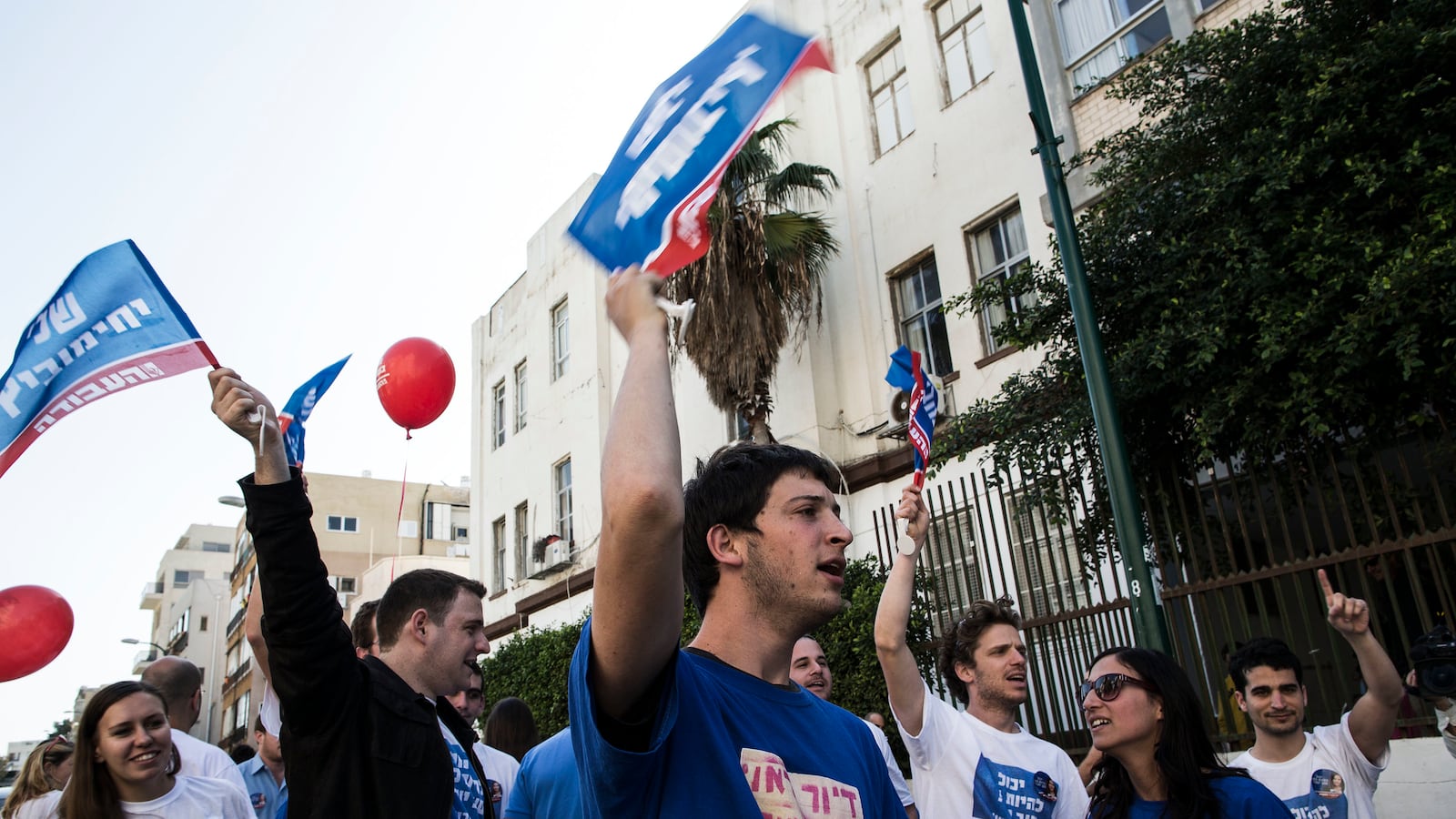In the early afternoon on Israel's election day, the atmosphere on the streets of Tel Aviv and its smaller coastal neighbors was unexpectedly jubilant. Cafes and beaches were crowded, families basked in the warm sun, and polling stations brimmed with life from the earliest hours. By noon, the general elections committee was able to report a turnout of over 26 percent, but shortly after 4pm Israeli voters closed in on 50 percent, outdoing recent election turnouts by one tenth. For the first time in a while, numerous Israelis of various political creeds could share a basic pride in their democracy. But the encouraging voting figures, and even the exceptionally beautiful winter's day, do not fully account for the sense of energy visible in Tel Aviv, and around Tel Aviv's cyberspace, this election day.

As evening fell, reports emerged that center-left-leaning areas are outperforming traditional right-wing areas. Nevertheless, very few Israelis would join Shelley Yehimovich's optimistic bet (tweeted and text-messaged at midday to thousands of voters) on a landslide and a government headed by herself. A vast majority accepts Benjamin's Netanyahu's next prime ministership as a fact. Tel Aviv, to generalize but slightly, dislikes Netanyahu and fears the future he personifies. So why smile?
Here is one interesting item of news: many Israelis may expect Bibi to win these elections, but far fewer will actually vote for him, probably fewer than in the previous elections by a notable margin. The second piece of news, easily noticeable today, is that the Zionist Left is resurfacing, reorienting and gaining confidence. And the third and crucial revelation is that civic participation is on the rise, the social protest of 2011 is alive and kicking, young people are intensely engaged, and the internet is connecting Israel's public sphere with its parliamentary democracy through highly effective links.Don't get me wrong. In the coming days and weeks, a coalition is likely to emerge which would be as right-wing, as supremacist, as peace-negating, and as blind to civil equality as the outgoing government has been. It will most probably be a Netanyahu-Bennett coalition, again bonding the constituencies of Likud and rightist-religious Habayit Hayehudi with the smaller forces of ultra-Orthodoxy and ultra-nationalism. Iran and Gaza will continue to serve as Netanyahu's prime trope of national and international policy, obliterating any horizon of hope.
No dialog with the Palestinians is on the cards, either. Infuriatingly, as if he took up the Israeli Right's "no partner" mantra, Palestinian president Mahmoud Abbas just blurted out that pre-world-war Zionism was demonstrably linked to Nazism. Thank you, Mr. Abbas, for weighing in so heavily for Likud and its allies on this election day.
Adding to our clearly foreseeable post-elections blues, the economy is heading for deepening crisis, laced by painful tax raise and spending cuts, all of which are likely to hurt Likud's traditional voters far more than those of the Left. The middle class will continue to sink. The few legislative triumphs scored by the social protest movement, and the vague official promises for more affordable housing, are likely to go down the drain. So why are the left and the center-left so energized? How come the turnout is higher, if most of Netanyahu's staunchest opponents expect him to remain in office?
As the sun sets on Israel's election day, five hours prior to the closure of the vote and the first exit polls, I would like to risk offering a cautiously optimistic note. For the first time since Yitzhak Rabin's assassination in November 1995, center-left Israelis are beginning to get their act tobether. From the ashes of the old Labor, after the timely or untimely passing of old Labor's leaders (with the unique exception of Shimon Peres), a new liberal-democratic Israel has come of age. It is not unified, but it speaks in similar voices and addresses the same key issues. Its leaders, members of my own generation, now in their fifties, are acting like responsible adults. To be sure, they lead too many parties. But their public voices, and future parliamentary collaboration, promise a well-orchestrated and politically sophisticated opposition. Shelly Yachimovich's Labor, Tzipi Livni's Hatnua ("The Movement"), Yair Lapid's Yesh Atid and—more assertively leftist, but proudly Zionist and newly energized—Zehava Gal-on's Meretz, are all capable of teaming up and spelling out the urgent agenda of almost half of all Israelis. It is the Tel Aviv opposition, if you like, but only if you take 'Tel Aviv' as shorthand and metaphor to many other parts of Israel.
Beyond Tel Aviv are the vast stretches of Israel's middle-class periphery, its smaller towns and villages where the kibbutz spirit is strangely alive, its social-democrat youth movements, and its middle-of-the-road moderates who want nothing better than stability and modernity. Linking Tel Aviv to its outposts is the vast and ever-expanding Hebrew blogosphere, Facebook activism, with Twitter slightly lagging behind (brevity was never a hallmark of Jewish wordiness). But in Israel, unlike the U.S.A., your online conversation almost always includes people you know, share friends with, or live nearby. So the web-to-social-activism route is far shorter, as the social protest movement has shown so impressively.
Not all the center-left parties will survive (my longevity bets are on Labor and Meretz), but they are poised to add up to a combative parliamentary opposition. They are publicly committed to the issues raised by the recent social protest, including price and taxation policies, living standards, civic equality, and aversion to ultra-Orthodox draft-dodging and ultra-nationalist racism. They may not speak in one voice, but they can speak in harmony and create a pragmatic front. And they have succeeded in igniting a large public of sophisticated and critical Israelis, old and young. The older generation, that of my parents, still remembers what Israeli social democracy looked like before the age of hyper-religiosity, militarism and atavism. The younger generation, that of my university students and teenage sons, is politicized to an astonishing degree. It is both Facebook-smart and street-smart, capable of launching internet protests that end up in city squares and in the polling stations.
A new Israeli public sphere is in the making. It stormed the streets in the summer of 2011, and it is alive and vociferous in the winter of 2013. Israel's liberal left has come to terms with being a political minority. Now it is flexing is muscle as a very large minority. Its blogosphere-to-Knesset dynamic is impressive. So here's my pre-exit-poll hunch: Tel Aviv is staunchly refusing to abandon hope.




